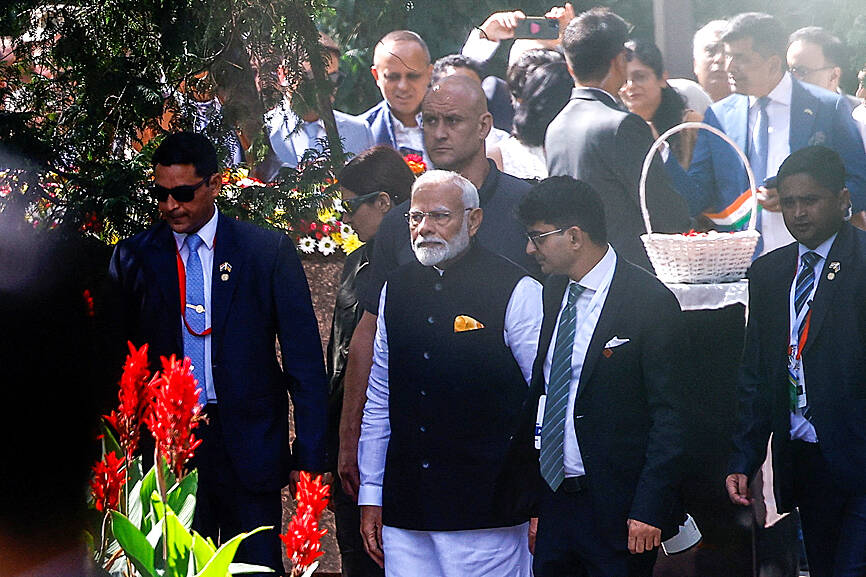Indian Prime Minister Narendra Modi yesterday arrived in Kyiv for talks with Ukrainian President Volodymyr Zelenskiy on a historic visit in which he is expected to push a settlement to end the war with Russia.
Modi is casting himself as a possible peacemaker, two-and-a-half years after Russia invaded and weeks into a major Ukrainian counteroffensive into Russian territory.
“No problem can be resolved on a battlefield,” Modi said ahead of his visit, adding that India supports “dialogue and diplomacy for restoration of peace and stability as soon as possible.”

Photo: Reuters
He is the first Indian prime minister to visit Ukraine.
A diplomatic breakthrough between Moscow and Kyiv looks more elusive than ever following Ukraine’s offensive into Russia’s western Kursk region.
It is also unclear whether Modi himself could be an effective dealmaker, seen by many in Ukraine as too close to Russian President Vladimir Putin.
Modi recently drew fresh condemnation in Kyiv for hugging the Russian leader during a visit to Moscow last month.
The Indian leader said that he planned to “share perspectives on peaceful resolution of the ongoing Ukraine conflict” with Zelenskiy, as well as discuss “deepening the India-Ukraine friendship.”
He was in Poland on Thursday before departing for Ukraine.
“As a friend and partner, we hope for an early return of peace and stability in the region,” Modi said on social media ahead of the visit.
Zelenskiy has said that “a number of documents are also expected to be signed” during the meeting with Modi.
Modi’s arrival was announced by Ukraine’s state rail operator, which published a video on Facebook of the Indian leader getting off a train in Kyiv.
Modi later wrote on X: “Reached Kyiv earlier this morning. The Indian community accorded a very warm welcome.”
While India has historically warm ties with Russia, it also courts closer security partnerships with Western nations as a bulwark against its regional rival China.
New Delhi has avoided explicit condemnation of Russia’s 2022 invasion and has abstained on UN resolutions that criticize the Kremlin, instead urging both sides to resolve their differences through direct dialogue.
However, a peace deal now appears further away than ever before.
Ukraine in 2022 passed a decree ruling out direct talks with Putin and Moscow recently said it would not countenance talks with Kyiv amid its surprise counteroffensive on Russia’s Kursk region.
Putin earlier this year demanded that Kyiv withdraw its troops from four Ukrainian regions that Moscow claims to have annexed — despite not having full control over them — as a precondition to negotiations.
Kyiv says that any temporary pause in the fighting would only give Moscow time to regroup and rearm for a future attack.

POLITICAL PRISONERS VS DEPORTEES: Venezuela’s prosecutor’s office slammed the call by El Salvador’s leader, accusing him of crimes against humanity Salvadoran President Nayib Bukele on Sunday proposed carrying out a prisoner swap with Venezuela, suggesting he would exchange Venezuelan deportees from the US his government has kept imprisoned for what he called “political prisoners” in Venezuela. In a post on X, directed at Venezuelan President Nicolas Maduro, Bukele listed off a number of family members of high-level opposition figures in Venezuela, journalists and activists detained during the South American government’s electoral crackdown last year. “The only reason they are imprisoned is for having opposed you and your electoral fraud,” he wrote to Maduro. “However, I want to propose a humanitarian agreement that

ECONOMIC WORRIES: The ruling PAP faces voters amid concerns that the city-state faces the possibility of a recession and job losses amid Washington’s tariffs Singapore yesterday finalized contestants for its general election on Saturday next week, with the ruling People’s Action Party (PAP) fielding 32 new candidates in the biggest refresh of the party that has ruled the city-state since independence in 1965. The move follows a pledge by Singaporean Prime Minister Lawrence Wong (黃循財), who took office last year and assumed the PAP leadership, to “bring in new blood, new ideas and new energy” to steer the country of 6 million people. His latest shake-up beats that of predecessors Lee Hsien Loong (李顯龍) and Goh Chok Tong (吳作棟), who replaced 24 and 11 politicians respectively

Young women standing idly around a park in Tokyo’s west suggest that a giant statue of Godzilla is not the only attraction for a record number of foreign tourists. Their faces lit by the cold glow of their phones, the women lining Okubo Park are evidence that sex tourism has developed as a dark flipside to the bustling Kabukicho nightlife district. Increasing numbers of foreign men are flocking to the area after seeing videos on social media. One of the women said that the area near Kabukicho, where Godzilla rumbles and belches smoke atop a cinema, has become a “real

‘WATER WARFARE’: A Pakistani official called India’s suspension of a 65-year-old treaty on the sharing of waters from the Indus River ‘a cowardly, illegal move’ Pakistan yesterday canceled visas for Indian nationals, closed its airspace for all Indian-owned or operated airlines, and suspended all trade with India, including to and from any third country. The retaliatory measures follow India’s decision to suspend visas for Pakistani nationals in the aftermath of a deadly attack by shooters in Kashmir that killed 26 people, mostly tourists. The rare attack on civilians shocked and outraged India and prompted calls for action against their country’s archenemy, Pakistan. New Delhi did not publicly produce evidence connecting the attack to its neighbor, but said it had “cross-border” links to Pakistan. Pakistan denied any connection to